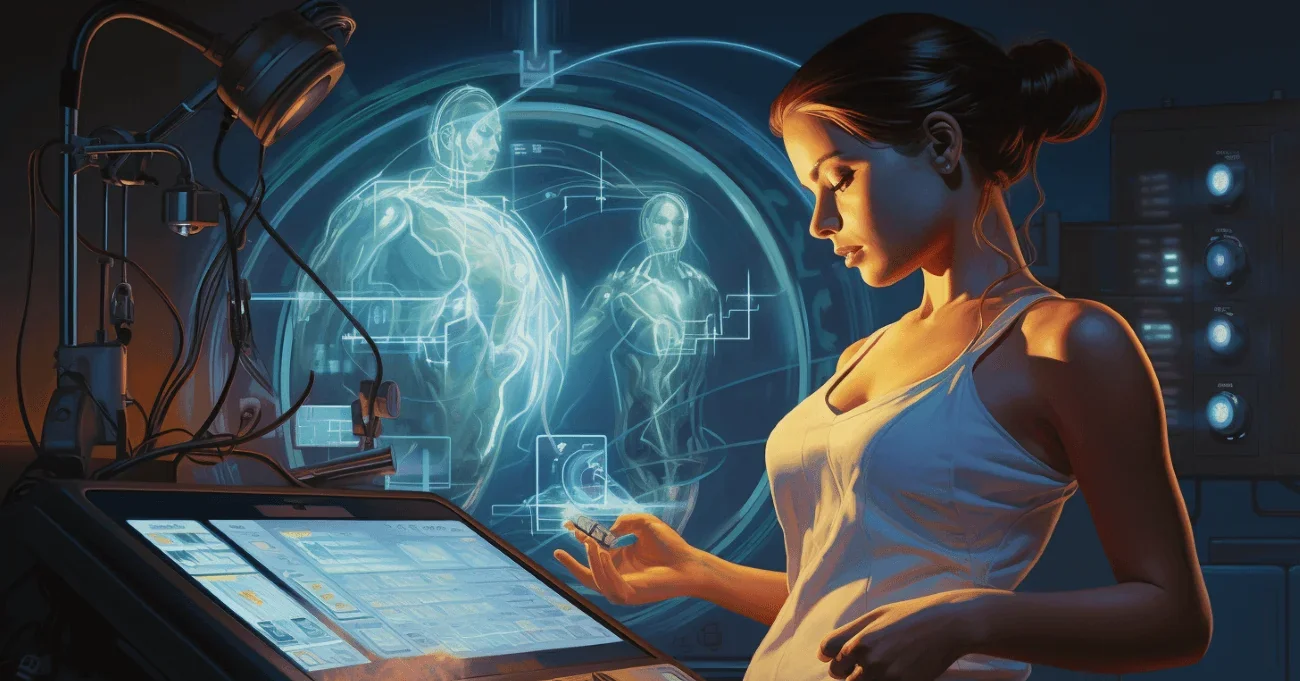New medical technology is being developed almost every day. Most companies in the healthcare industry utilize these advancements not only to help mitigate some of the pain points in handling the business but also to establish a strong foundation for a better overall system. Understanding the most important new medical technology integrations is an essential step in this modern age.
Our team at Aloa strives to find the best software developers who can break down new trends and technological breakthroughs while partnering with clients to help formulate a working system. We encourage and empower our customers to work with engineers and developers to help better discuss and communicate a well-made strategy to implement these innovations for their projects.
In this blog post, we will talk about integrations that can benefit new medical technology. We will also discuss the impact of these new technological developments on the healthcare system and how they can help shape the future of companies around the globe.
Let's begin.
What are Integrations For New Medical Technology?
Integrations for new medical technology focus on streamlining the entire healthcare system in an industry. Every component, from data management to communication between different departments and systems to interoperability between medical devices, is a crucial component involved in maximizing the potential of integrations.
5 Essential New Medical Technology Integrations for EMR Systems
Tracking and monitoring a patient's electronic medical record (EMR) is essential to providing the best medical procedure possible. Instituting a robust clinic management system with new medical technology integrations enables healthcare organizations to streamline and automate various processes that address a patient's medical needs.
These are some examples of integrations for new medical technology EMR systems:
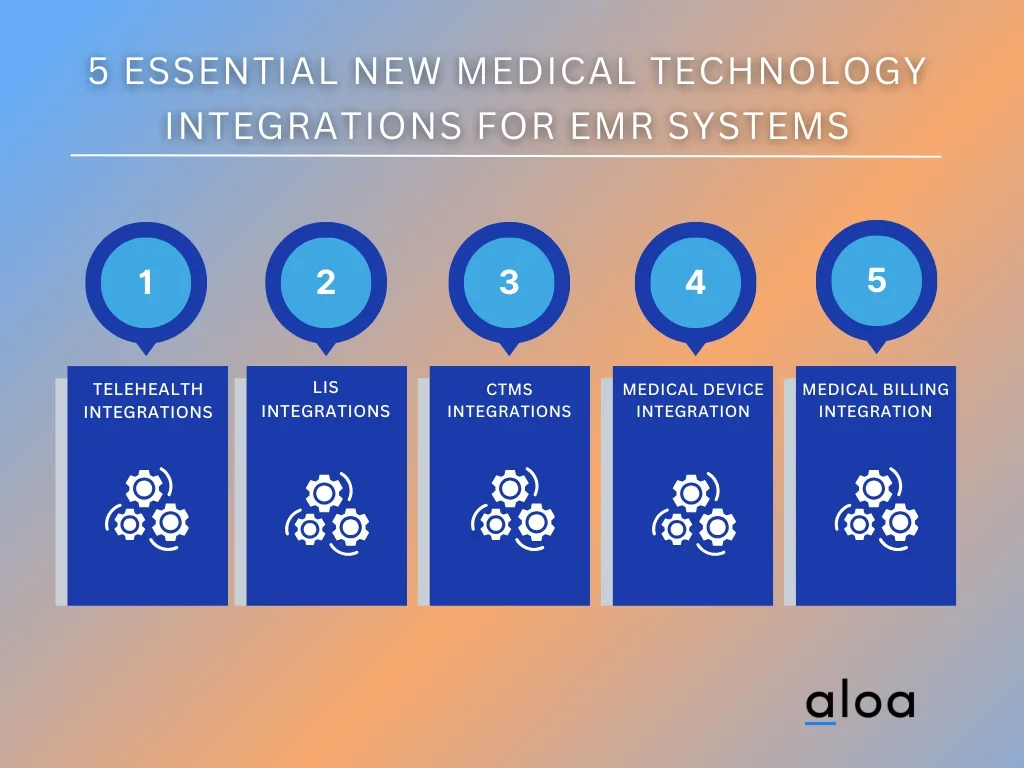
Integration #1: TeleHealth Integrations
Telehealth solutions are a rapidly growing demand in today's medical technology infrastructure. Integrating telehealth services such as video conferencing tools, remote patient monitoring systems, video coaching software, and telemedicine platforms opens up more opportunities to improve communication between medical professionals and patients.
Telemedicine also enables medical practitioners to create a documented list of medicinal prescriptions for their patients, from weight loss medications to antidepressants, and directly send it to partnered pharmacies. This process lowers the risk factors of patients abusing or mishandling their prescriptions. Also, it makes communication simpler between different healthcare establishments. As telehealth becomes more integrated into healthcare infrastructures, patients are increasingly turning to platforms that support services like online prescription delivery, combining efficiency, convenience, and compliance with modern medical standards.
Integration #2: Laboratory Information System Integrations
Laboratory information is a crucial step in diagnosing a patient's medical samples. Having sufficient laboratory information system integrations improves the data processing aspect of each sample. Each laboratory system can facilitate different components of medical data, from blood testing to blood pressure monitoring.
Streamlining laboratory processes is not the only benefit to information systems integration. All medical samples and data can be stored and transferred to other laboratory systems for faster diagnostics. Enhancing privacy within an established software system can prevent sensitive data from leaking to the public or to other personnel.
Integration #3: Clinical Trial Management System Integrations
Patient population management can overwhelm any hospital or clinic should the system fail to process each medical record correctly and successfully. Clinical trial management system integrations focus on protecting a patient's data while ensuring compliance and regulatory standards are set for any medical services or clinical trials.
Clinical trial management also aids in understanding and discovering uncommon or rare diseases through the use of efficient data analysis and interpretation. Optimizing data collection from clinical trials can also be used for artificial intelligence and machine learning modules, which benefit the entire healthcare industry.
Integration #4: Medical Device Integration
Life-saving medical devices have evolved steadily over the course of the healthcare industry's inception. Integration with advanced medical devices allows healthcare facilities to take full advantage of the needs of their patients while minimizing risks such as heart disease. These devices can also help better monitor and track a patient's vitals without compromising staff time and research.
There is a massive increase in the use of at-home medical and wearable devices for monitoring and diagnostics. Having medical device integration within a healthcare organization's system makes it easier for doctors to have a stronger foundation to deal with new patients. Easily contaminable illnesses such as viral infections can also be addressed much quicker through the use of these medical devices.
Integration #5: Medical Billing Integration
Billing and reimbursement for procedures is a lengthy and complicated task. Ensuring that every utility, resource, time, and service is properly calculated can make the entire medical billing process long and arduous. Medical billing integrations can drastically cut the time to process each patient's records while enabling easier access to information such as medicare insurance.
Top 3 EMR System Integration Solutions
EMR API system integration solutions can vary depending on the product and the developers that formatted their software structure. It's essential to consider the different options available for each healthcare organization to determine the most optimal solution that integrates well with their existing medical technology.
Here are the top three EMR system integration solutions:
1. Digital Health - Interoperability Integration
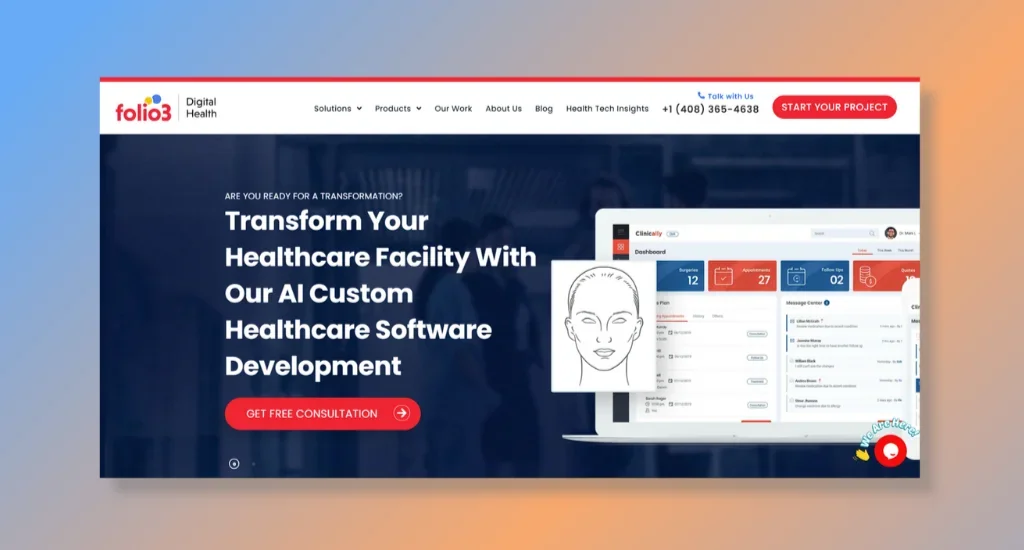
Digital Health focuses on maximizing interoperability in all healthcare systems. This approach ensures that all EMR integrations can be successfully implemented while minimizing the risks of losing productivity in the workplace. Flexibility between clinical decisions, telehealth integration, and health information exchange allows hospitals and clinics to remain vigilant with their EMR needs.
Every component of Digital Health caters to utilizing each department's digital support through the use of various functionalities and services. Some of their offerings include interface development, data conversion, and electronic prescriptions.
2. SECA - Accurate EMR Support
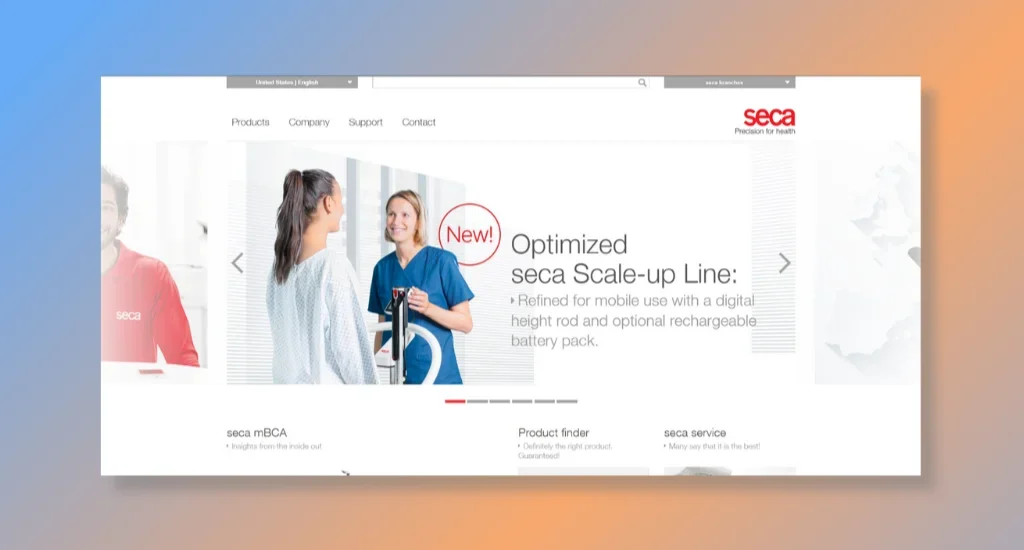
SECA ensures all clients that their EMR system integration solutions target precise metrics needed for all medical records. This company's approach to precision in analyzing proper medical doses enables it to provide a strong focus on enabling accurate dosage requirements, especially for children and infants.
Pharmaceuticals and nursing staff can easily use their services for integration to eliminate potential dosage errors while still streamlining the efficiency of their healthcare services. SECA also provides sufficient medical hardware and software to help automate the collection of EMR data through the use of its integration services.
3. Inoxoft - Custom Software Development
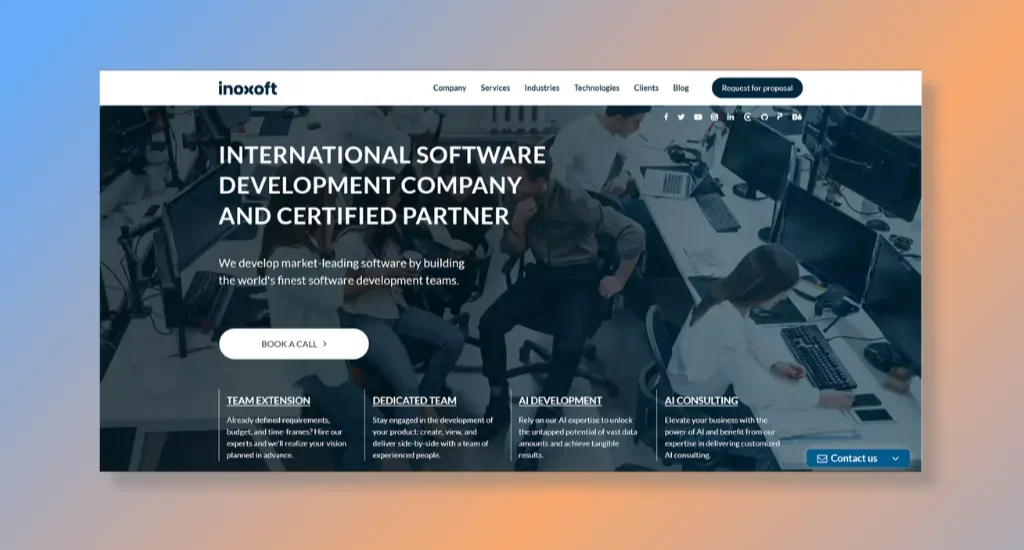
Inoxoft is a software development company that has a dedicated team of developers specializing in EMR healthcare integration. They offer their services for healthcare industries of varying sizes regardless of the platform or scope of their companies to ensure both large-scale and small businesses can be catered to.
Inoxoft's specialty in software engineering also offers additional services outside of EMR integration, such as cloud-based storage alongside government service implementation, which greatly benefits businesses looking for long-term solutions.
5 Essential New Medical Technology Integrations For Healthcare CRM Systems
Customer relationship management (CRM) is a component that should always be at the forefront of the healthcare industry. Taking charge of managing a patient's health and well-being also includes making sure that the overall medical experience of patient care is carefully managed and monitored.
These are 5 essential new medical technology integrations for healthcare CRM systems:
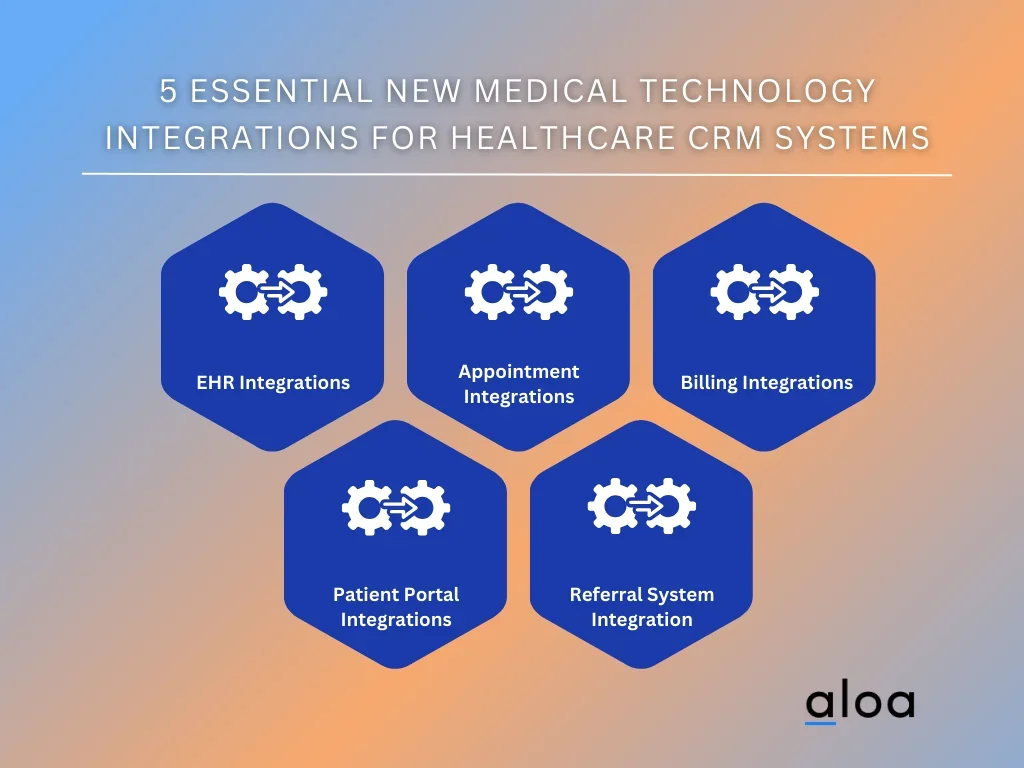
Integration #1: Electronic Health Record (EHR) System Integrations
Electronic health records keep track of a patient's entire personal information. This data is easily accessible by other healthcare providers, which helps speed up the process of understanding each client's health history. Integrating new technologies in EHR systems allows medical services to be personalized and streamlined to cater to individual patients' needs.
Integration #2: Appointment and Scheduling Integrations
Efficient appointment scheduling and reminders are crucial for maintaining a well-organized healthcare system. Integrating scheduling and reminder systems with healthcare CRM allows for seamless appointment management, reducing no-shows and ensuring timely patient engagement. Doctors and healthcare providers can also use these integrations to better regulate and adhere to various treatment plans.
Integration #3: Billing and Payment Integrations
Advancement in new medical technology allows better integrations to improve the overall financial component of a healthcare organization. Managing both billing and payment integrations helps make all processes simpler and faster and protects a patient's sensitive information.
Integration #4: Patient Portal Integrations
Engagement with a patient enables seamless communication and provides better satisfaction for dealing with medical records. New medical technology that utilizes patient portal integrations promotes a more proactive approach to dealing with personal health and wellness. Leveraging patient portal integrations helps ensure ethical concerns while allowing users to access relevant information on their personal devices.
Integration #5: Referral System Integration
The healthcare industry focuses on keeping patient experience at the most optimal level. Ensuring that all patients have the opportunity to discuss relevant referrals can guarantee the quality of medical professionals and the service that they provide. Implementing a referral integration system helps provide better insight so that both the healthcare industry and users can check for transparency.
Best Overall Healthcare CRM Integration Solutions
Various medical software companies specialize in CRM integration solutions that can help new medical technology seamlessly track and manage different patient data. These companies also offer additional services that focus on minimizing delays with backlog management by automating different types of processes to enable better patient experience.
These are some of the best overall healthcare CRM integration solutions:
1. Onpipeline - Personalized Patient Experience
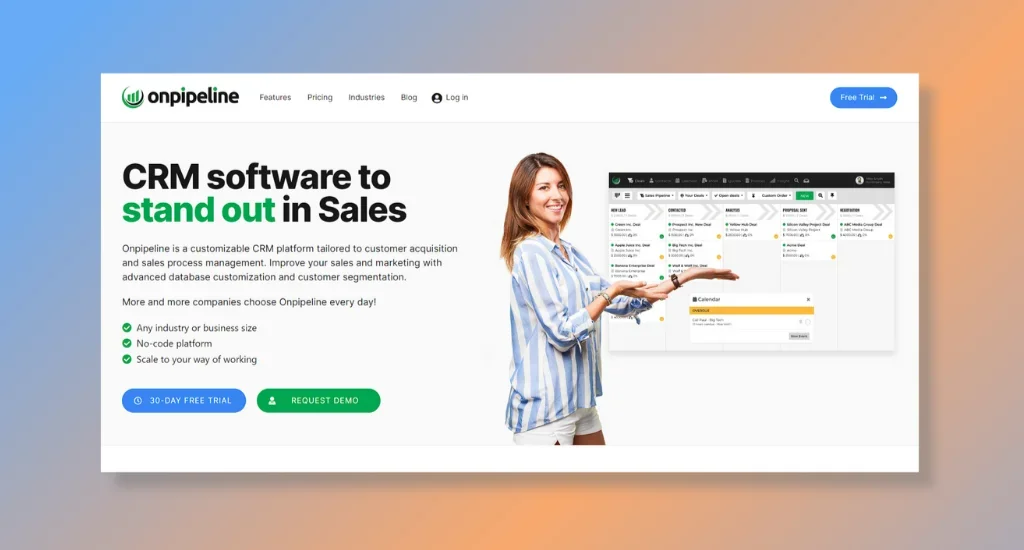
Onpipeline focuses on ensuring maximum engagement with personalized patient management and experience. The main approach of Onpipeline is to provide a 360-degree profile of each patient in one centralized source and help filter through different customizable data groups depending on the needs of the healthcare company involved.
Clients can also use comprehensive patient data to help visualize active data acquisition to provide better and faster treatment through a detailed list of the patient's wants, needs, and preferences. Additional CRM functionalities include a hands-on appointment booking service to enable users to schedule with their respective doctors through a simplified online process.
2. Leadsquared - Industry-Specific CRM Designs
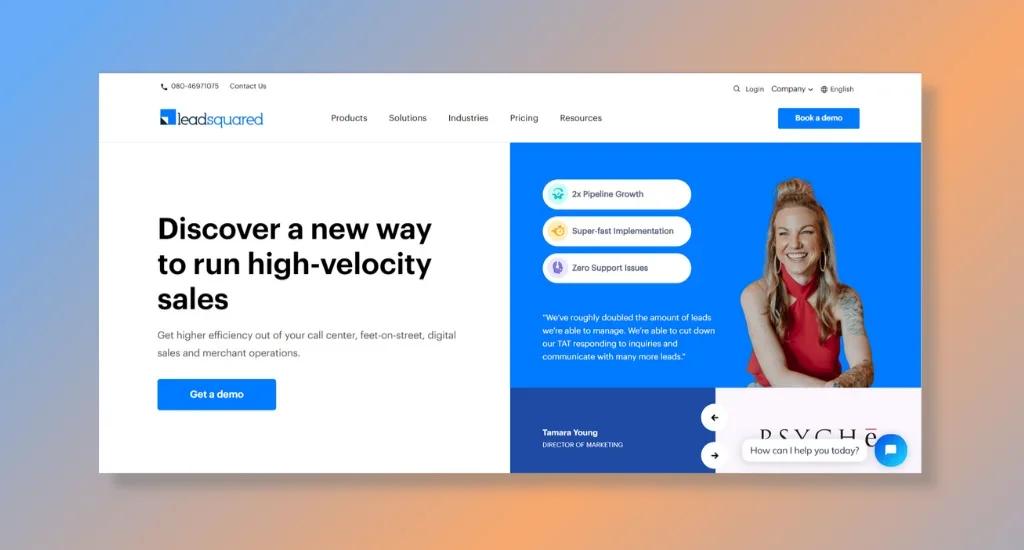
Leadsquared emphasizes building a CRM platform based on the specific industry and system of the healthcare business involved. A detailed and systematic approach is applied to ensure that the company can provide custom CRM software that includes all the needs and goals of the healthcare organization involved.
From front-office administrators to specific intake specialists, all departments and components of a healthcare industry can take full advantage of Leadsquared's CRM services. A specific checklist of over 650 CRM options is offered for every new client to fill out to help Leadsquared create a sophisticated sorting program for your healthcare needs.
3. HIPAACRM - Cloud-Based System
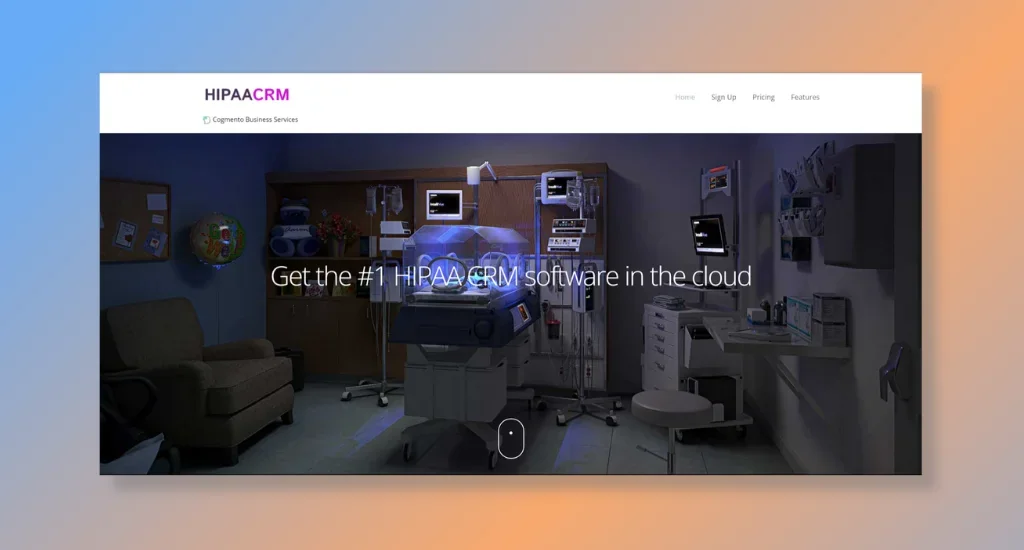
HIPAACRM is a cloud-based CRM system designed to adhere strictly to the stringent HIPAA standards. Each feature and function directly operates under a clear understanding of the importance of following the healthcare industry protocols. This platform also comes equipped with mobile IOS and Android integration support right out of the box for easier usability.
The main target for this CRM system is to make the process of handling patient tracking, sales pipeline, event management, and personnel monitoring in a single, easy-to-use platform. Being a cloud-based system, healthcare establishments can easily access relevant data and critical information without any fear of data loss and delays with processing treatment and scheduling.
Considerations To Take When Choosing New Medical Technology Integrations
Developing new advancements in technology takes a strong commitment process. Most healthcare industries have an existing system in place that determines how most of the functions operate. Integrating new medical technology involves a careful process to ensure that the implementation and delivery greatly benefit the final result to ensure that the system does not offer diminishing returns.
Here are some considerations to take when choosing new medical technology integrations:
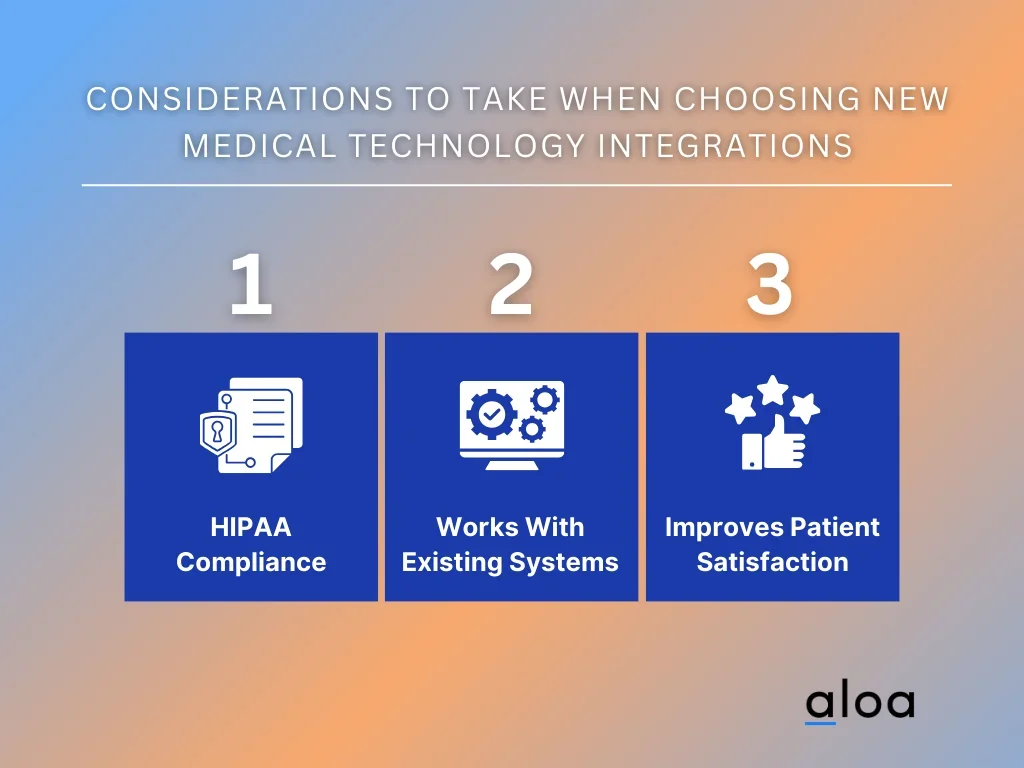
HIPAA Compliance
The Health Insurance Portability and Accountability Act is an integral component that determines whether a system aligns with the standards and regulations set by the US government. Healthcare industries must adhere to HIPAA compliance and FDA approval regulations to ensure that both patients and personnel receive the proper privacy, security, and integrity of their personal health information.
Utilizing new medical technology integrations should always first undergo a careful examination process before implementing it in a public system. Coordinate with your software developers to ensure that the systems in place can accommodate the standards and rules set by the Department of Health and Human Services and by the Office for Civil Rights to prevent fines or penalties from occurring.
Works With Existing Systems
New technology is always exciting regardless of the industry. However, healthcare is a platform that should always ensure reliable and consistent service at all times. Dealing with the health and well-being of patients should ensure that the time and resources spent on integrating new medical technology are sufficient for the existing in place rather than needing to replace or discard a functioning system.
Consult with professional software developers about the implications of integrating the new medical technology before investing in the production of these new systems. The planned integrations should also be addressed to all personnel involved to ensure that they can successfully operate the new developments with ease, either through an onboarding process or a trial run before launching it completely.
Improves Patient Satisfaction
The main focus of utilizing new medical technology integrations into a healthcare system is to improve the handling and delivery of patients. Every aspect of delivery, from logging in medical history to the billing process, can determine the satisfaction levels of each patient. Clinicians can also increase their productivity and efficiency with better integrations of new medical technology.
Having systems that focus on improving the medical experience of your organization will directly lead to better patient satisfaction. Take the opportunity to determine the main weak points in your current healthcare system to help address the more pressing problems before integrating new innovations on properly working components.
Key Takeaway
Innovative integrations with new medical technology open up more potential to engage with patients while also simplifying complex healthcare processes within a system. Most companies that opt to enhance their current EMR and CRM software systems will require careful implementation and integration with other existing tools to better cater to specific company needs.
Streamlining different processes with medical and health records establishes better management for all departments of a clinic or hospital. Companies can also use this opportunity to grow their business by establishing trust with their clients through better patient engagement. It can also improve other components of healthcare, such as mental health and prosthetics support.
If you want to dive deeply into the world of new medical technology, contact us at [email protected] to get started.

